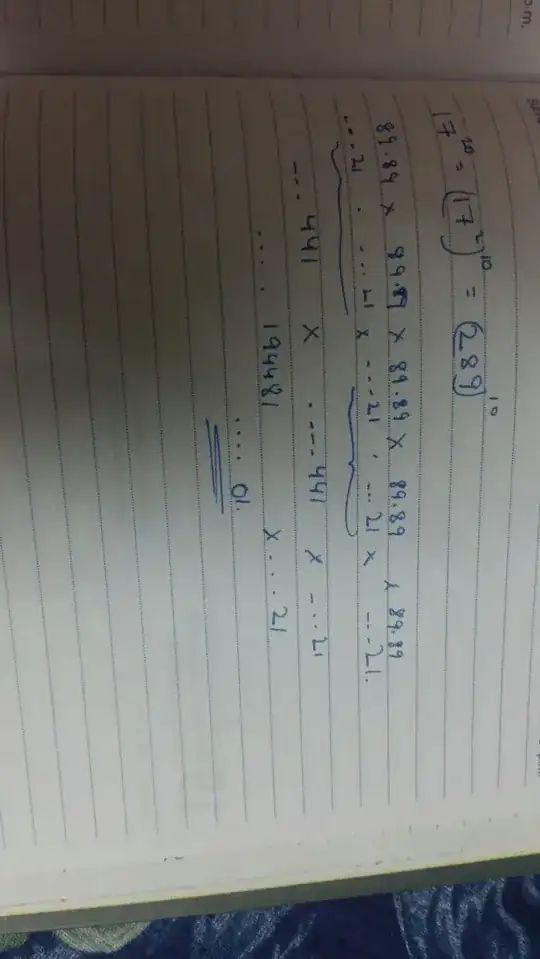My attempt is in this image. But I want the answer to this question by using modulo congruence method since the method used by me involves tedious calculations.
-
$01$ is the right answer – Dr. Sonnhard Graubner Jan 08 '17 at 07:58
-
I know that. I told I want the solution using modulo operator. – Yami Kanashi Jan 08 '17 at 07:59
-
1You can search the questions on MSE for a dozen of similar questions. – Jan 08 '17 at 08:00
-
Is MSE maths Stack exchange? – Yami Kanashi Jan 08 '17 at 08:01
-
We expect you to search the site before posting. See the list of "Related" questions in the right margin. There are several very good matches in there such as this. We have also collected many relevant techniques to this thread – Jyrki Lahtonen Jan 08 '17 at 09:18
4 Answers
Working modulo $100$,
$17^{20} \equiv 289^{10} \equiv (-11)^{10} \equiv (10+1)^{10} \overset{binom}{\equiv} \binom {10}1 10^1\cdot 1^9 + 1 \equiv 1 \pmod{100}$
So the last two digits are $01$.
- 26,801
Euler $\phi(5^2)=5\cdot4=20$ so $\,17^{20}\!\equiv 1\pmod{5^2}.\,$ Also $\,17^{20}\equiv 1^{20}\equiv 1\pmod 4,\ $ therefore $\,4,25\mid 17^{20}\!-1\,\Rightarrow\, 4\cdot 25\mid 17^{20}-1$
- 272,048
Oh, just to be different.
$17^{5} \mod 100 \equiv$
$(20 - 3)^5 \mod 100 \equiv$
$\sum_{k=0}^5 {5 \choose k} 20^k*(-3)^{5-k} \mod 100 \equiv$ [all but the last term is divisible by $20*5 = 100$]
$(-3)^{5} \mod 100$
So
$17^{20} \mod 100 \equiv$
$(-3)^{20} \mod 100 \equiv$
$9^{10} \mod 100 \equiv$
$(10 - 1)^{10} \mod 100 \equiv$
$\sum_{k=0}^{10}{10 \choose k}10^k(-1)^{10 - k} \mod 100 \equiv$ [all but the last term is divisible by $10*10 = 100$]
$\equiv 1 \mod 100$.
So last two digits are $01$.
....
So... tedious calculations need not be that tedious.
- 124,253
The units digit of $17^1$ is equal to $7$.
The units digit of $17^2$ is equal to $9$.
The units digit of $17^3$ is equal to $3$.
The units digit of $17^4$ is equal to $1$.
Calculating,
$\quad 17^4 = (17^2)(17^2) = (289)(289) \equiv (-11)(-11) \equiv 21 \pmod{100}$
Continuing,
$\quad 21^2 \equiv 41 \pmod{100}$
$\quad 21^3 \equiv 61 \pmod{100}$
$\quad 21^4 \equiv 81 \pmod{100}$
$\quad 21^5 \equiv \;\,1 \pmod{100}$
So,
$\quad 17^{20} = (17^4)^5 \equiv 21^5 \equiv 1 \pmod{100}$
- 11,366
